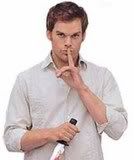Dexter and the Goetia

I just finished listening to book 3 in the "Dexter" series entitled "Dexter in the Dark." It wasn't necessarily my favorite title in this series, in fact it's probably my least favorite of the three, but it raised an interesting spectre that I want to talk about for a minute.
In the first two books of the Dexter series, Dexter makes reference to his "dark passenger," the presence that drives him to homicide. In those two works, I as the reader, inferred that this was something akin to a twisted, corrupted conscience. Something like the small voice inside that tells you not to do something, only, in this case, it builds up this urge within him to make him want to hunt and kill other people.
Dexter bears the normal profile of a serial killer, traumatic childhood, animal torture, sociopathy, etc. But his stepfather, Harry, recognized these signs early on. So he trained Dexter so that his urges could be socially productive, and, since he was a police officer, to help him get away with murder by completely disposing carefully of all traces of evidence.
Somewhere along the line, I believe in book two, Dexter realizes that his girlfriend's children, Cody and Aster, have similar homicidal tendencies. In book 3 this takes on an entirely new dimension as he begins to train the children to follow Harry's Code, for their own safety and the safety of the innocent. He feels compelled to be a father figure to these children, and takes them under his dark wings.
But in "Dexter in the Dark" everything changes. Dexter changes, and the reason behind why he is a killer is revealed. And, oddly, it has nothing to do with psychology at all.
As with each book, the police investigative team are on the trail of a fresh set of homicides. Two girls were burned, decapitated, and their heads replaced with ceramic bull heads. It's assumed, but unclear what kind of killer would do this. It appears ritualistic and it seems old, but no one on the force has ever seen anything like it. In fact, Dexter himself feels the shrivelling and quiet of his "dark passenger" until it has in fact left him.
How can a homicidal sociopath stop being a homicidal sociopath? What within him changed psychologically to make this happen? The answer, it seems, is less than psychological, it is in fact supernatural.
As the reader progresses through the book, we discover that this killer, or rather cult of killers, are actually devotees of Moloch, some of whom are actually completley possessed by the spirit of the God. Moloch is the darkest of these shadow passengers, and those who are indwelt by these shadows have a preternatural sight to recognize shadows within others. Cody recognizes the shadow in Dexter, and Dexter recognized it in all of his victims. The Watcher, the leader of this cult of Moloch, sees the shadow in Dexter and realizes that Dexter's shadow has been corrupted somehow. The reader is left to presume that because Dexter kills with a just purpose, those whose indwelling spirits are pure evil recognize him as an aberration, an abomination.
A lot of Dexter's research into spirit possession in this book lead him back to tales of Solomon. And while it was never explicitly mentioned, it's clear that what he stumbled across was the Goetia. For those of you who may not know what this is, it is a compendium of demons believed to have been in service to King Solomon, and the key to binding these demons into one's service. The spirits in the Goetia are summoned as an evocation, bound in a triangle to hold them from wreaking havoc on your temple, home, or even yourself. Not having read through the entire book I don't know of any that are meant to be invoked into the human body. In fact I would probably wager a guess to say that none of them probably are meant to be invoked.
This leaves a number of questions for the reader knowledgeable in occult literature. Who is this spirit dwelling within him? Given that Dexter has mastered control of his own indwelling demon, how different is this from the kind of binding that the magus uses to control his demons? The presence of Moloch, the ancient God, led Dexter's demon to flee; how many more dark ancient ones are out there, and will they be making a guest appearance in Miami? Is Dexter's demon stronger for having lived through this experience? Will Dexter's tutelage conquer and twist the demons dwelling in his step-children, making them mini-magi?
For the casual reader of murder-mystery novels though, is this occult tack a cop out? Is this just chucking out the window years worth of psychological research into the minds of homicidal maniacs? Or is this where the series was going all along?
I have some mixed feelings about the story. I'm glad that the ending resolved where it did, though I wish that Nick Landrum (the reader for Recorded Books editions of Dexter) wouldn't stop as frequently as he does, leaving deep pregnant pauses. It makes me think the story is over, when really he's just being dramatic. Also, there were moments where I wanted to tell them to start thinking like cops and start doing some damn investigating. They went down all these crazy winding pathways and never really explored some of the most obvious things. That was frustrating.
I liked that it started to go supernatural, but that's just me. If you're a fan of murder mystery things, or a fan of the show, it's probably still a good fit. I wonder if the show will go this route. Somehow I doubt it, but you never know.